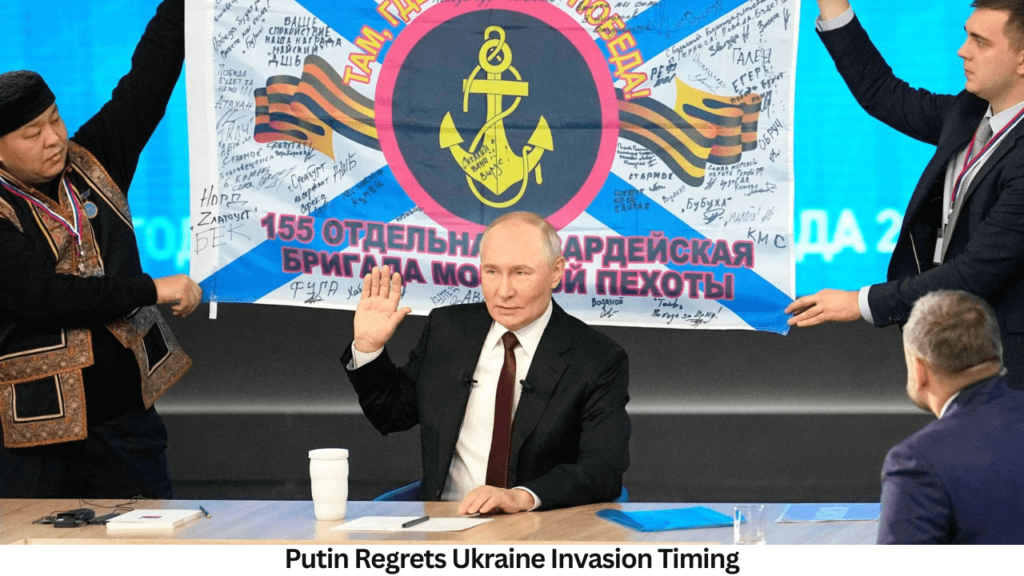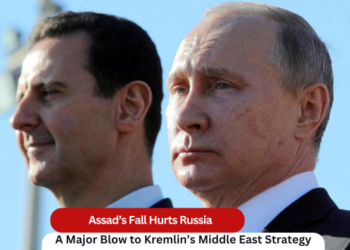Russian President Vladimir Putin has publicly stated that he regrets not launching a full-scale invasion of Ukraine sooner, emphasizing that Russia should have been better prepared for the war. During his year-end press conference, which was broadcast across major Russian TV channels, Putin discussed a range of topics, including Russia’s military operations, the situation in Syria, and his country’s evolving nuclear doctrine. As the war in Ukraine continues to dominate global attention, Putin’s reflections on the conflict’s timing and the challenges Russia faces have sparked renewed interest.
Putin Regrets the Timing of the Ukraine Invasion
In his extensive four-hour press conference, President Putin explained that with the benefit of hindsight, Russia should have initiated the invasion of Ukraine much earlier. Referring to the 2022 invasion as a “special military operation,” Putin acknowledged that more “systemic preparation” would have been beneficial before taking such a monumental step. He also reflected on the broader geopolitical context that led to the decision to invade, highlighting Russia’s previous actions, such as the annexation of Crimea in 2014, and the simmering conflict in Eastern Ukraine.
Putin’s regret over the timing comes amid increasing international scrutiny of Russia’s actions in Ukraine. While he presented the invasion as a necessary step, his comments suggest a recognition of the military and diplomatic challenges Russia now faces. The delay, according to Putin, meant Russia was unprepared for the scale and scope of the confrontation that unfolded.
The Long Road to War: How Putin Viewed the Build-Up
Putin’s reflections on the Ukraine invasion timeline also shed light on his views regarding the preparation—or lack thereof—that preceded the conflict. He stated that the situation in Ukraine had been building for years, with Russia’s influence in the region growing steadily, particularly after Crimea’s annexation. Despite this, the invasion itself was not as thoroughly planned as it might have been, leading to difficulties on the battlefield and in the diplomatic arena.
The War’s Impact on Russian Sovereignty
A major theme throughout Putin’s remarks was Russia’s sovereignty, which he views as having been restored under his leadership. In his end-of-year address, Putin framed the war in Ukraine as a crucial step toward securing Russia’s sovereignty in the face of Western influence. He claimed that without the actions taken in Ukraine, Russia would have faced a complete loss of sovereignty. The war, according to Putin, has reaffirmed Russia’s independence and its ability to protect itself against external threats.
However, Putin also acknowledged the toll the conflict has taken on Russia, both in terms of international relations and domestic resources. Despite the negative impact of Western sanctions, Putin remains steadfast in his belief that Russia is moving toward a future of greater self-reliance.

Putin’s Position on Nuclear Doctrine and Global Politics
As part of the discussion on Russia’s future, Putin also touched on the country’s nuclear policy. In November, Russia altered its nuclear doctrine, allowing for the use of nuclear weapons in response to attacks on Russia or its allies, including Belarus. Putin emphasized that this change in policy signaled Russia’s willingness to defend its sovereignty by any means necessary.
In the same press conference, Putin discussed Russia’s growing relationship with China, emphasizing the unprecedented strength of their partnership. He highlighted the countries’ joint efforts on the global stage and positioned Russia-China relations as a critical counterbalance to Western influence.
Putin’s Reflections on Syria and Domestic Issues
Beyond Ukraine and nuclear policy, Putin also addressed Russia’s role in Syria. He dismissed the notion that Russia’s military intervention in Syria had been a failure, despite the recent changes in leadership in Damascus. Putin claimed that Russia’s support of President Bashar al-Assad was not in vain and that the country would maintain its strategic military presence in Syria.
Additionally, the Russian president was asked about various domestic issues, including the state of Russia’s economy and the role of public institutions. While he did not provide new details, Putin’s remarks suggested that he views the domestic situation as stable, despite the ongoing challenges of international sanctions and internal political unrest.
Putin Regrets Ukraine Invasion Timing: Moving Forward
Looking ahead, Putin’s regret over the timing of the invasion is unlikely to change the course of the ongoing war. However, it does provide valuable insight into his strategic thinking and the pressures Russia faces in this prolonged conflict. While Putin insists that Russia is making progress on the frontlines and continues to defend its interests in Ukraine, his comments suggest a growing awareness of the difficulties the country faces on multiple fronts.
As the war in Ukraine continues to unfold, Putin’s reflections on the invasion’s timing may serve as a critical point of analysis for observers both inside and outside Russia.














































